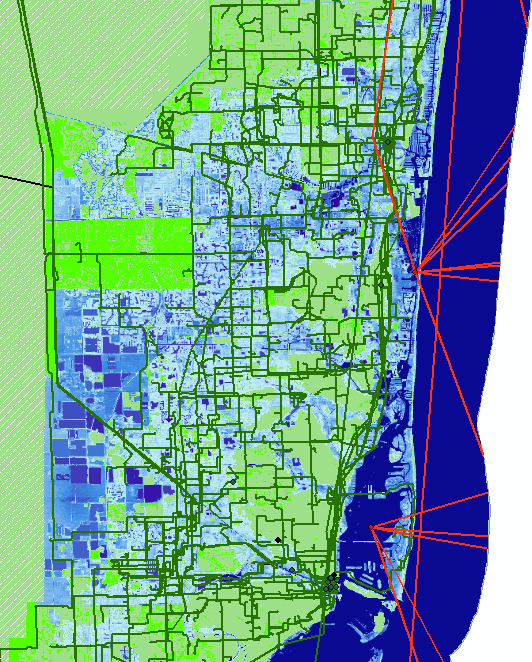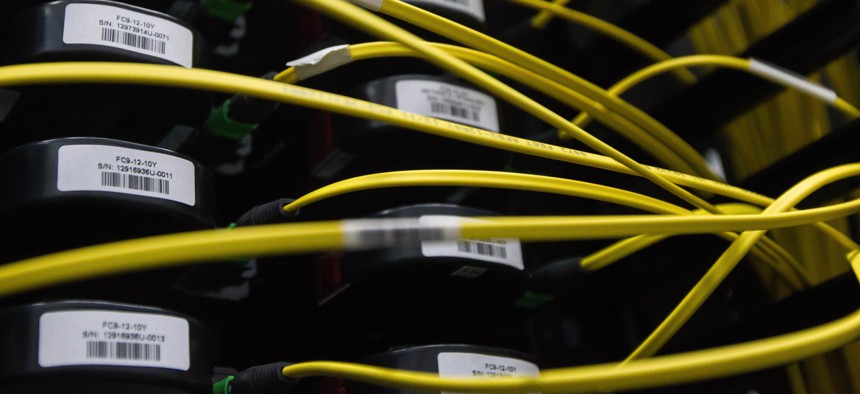Connecting state and local government leaders
Rising sea levels could threaten internet access for millions of people, according to a recent study.
Thousands of miles of fiber optic cables in coastal communities may be underwater within 15 years due to rising sea levels, threatening internet access for millions of people, according to a study by researchers at the University of Wisconsin and the University of Oregon.
The study, titled Lights Out: Climate Change Risk to Internet Infrastructure, combines sea level rise projections from the National Oceanic and Atmospheric Administration with data from the Internet Atlas, a global map of the internet’s physical infrastructure.
Researchers found that 4,067 miles of fiber conduit and 1,101 data centers and connection points will be “surrounded by water” in the next 15 years. Heavily populated coastal areas, including New York City, Seattle and Miami, are most at risk, as are large-scale internet service providers, including AT&T, CenturyLink and Inteliquent.
But the effects would not be limited to just those areas or providers and could potentially disrupt communications across the globe. Some damage could occur sooner than the 15-year threshold, according to study authors Paul Barford, Carol Barford and Ramakrishnan Durairajan.
“The results of our analysis show that climate change-related sea level incursions could have a devastating impact on internet communication infrastructure even in the relatively short term,” they wrote. “Given the fact that most fiber conduit is underground, we expect the effects of sea level rise could be felt well before the 15-year horizon.”
Fiber-optic cables buried underground are designed to withstand some degree of water and severe weather, but most are not waterproof and were “not designed to be under water permanently,” the study says. “Water, humidity and ice have long been recognized as threats” to cables and can cause various kinds of damage, including reduction in strength of signal, corrosion and fiber breakage.

Mitigation techniques exist—among them special coatings (known as “cladding”) and gels—but those only enable cables to function “for decades under normal/expected environmental conditions,” the study says. Sea level rise exacerbated by climate change does not fit that profile, and much of the country’s infrastructure is aging, which increases the risk of damage.
“The fact that a great deal of conduit infrastructure was deployed over the past twenty years and is aging means that all seals and cladding are likely to be more vulnerable to damage, especially if they are under water,” the study notes.
Researchers said their analysis should be considered conservative “since it does not consider the threat of severe storms” that typically result in temporary storm surge and water levels higher than the predicted average. (Network disruption during mega-storms, including Hurricane Katrina and Hurricane Sandy, are examples of temporary but significant damage.) It also “does not consider any efforts to harden or fortify communication infrastructure since we argue that this will only be feasible in relatively small geographic areas.”
Likewise, it’s difficult to project the effectiveness of countermeasures like sea walls, but mitigation efforts and planning are important, researchers say. The study recommends that municipalities begin discussing ways to reduce risk, measures that can include creating backup and alternate routes that “reduce the impact of coastal infrastructure failures” and hardening critical infrastructure in vulnerable areas.
That could mean investing in hardened enclosures for underwater cables, the study says, or creating “mechanisms, protocols and systems to enable new methods for risk-aware and reliable routing, and policies for spectrum re-allocation so that first responders can communicate with minimum or no interruption.”
Kate Elizabeth Queram is a Staff Correspondent for Government Executive’s Route Fifty and is based in Washington, D.C.

NEXT STORY: Cloud migration made easy



